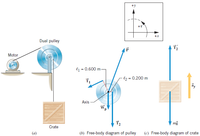
Elements Of Electromagnetics
7th Edition
ISBN: 9780190698614
Author: Sadiku, Matthew N. O.
Publisher: Oxford University Press
expand_more
expand_more
format_list_bulleted
Concept explainers
Question
A crate of mass 451 kg is being lifted by the

Transcribed Image Text:The image consists of three parts, illustrating the mechanics of a dual pulley system. Below is a detailed explanation suitable for an educational website:
### (a) Dual Pulley and Crate System
- **Description**: This section shows a dual pulley system connected to a motor. The pulley is attached to a crate, which is being lifted vertically. The motor drives the rotation of the pulley, enabling the lifting of the crate.
### (b) Free-Body Diagram of Pulley
- **Components**:
- The pulley is depicted with two radii: \(\ell_1 = 0.600 \, \text{m}\) and \(\ell_2 = 0.200 \, \text{m}\).
- **Forces**:
- \(\vec{T}_1\) and \(\vec{T}_2\) are tension forces acting at different distances from the axis.
- \(\vec{P}\) represents force applied by the motor.
- \(\vec{w}_p\) indicates the weight of the pulley.
- **Axis**: The center of the pulley denotes the axis of rotation.
### (c) Free-Body Diagram of Crate
- **Components**:
- The crate experiences a tension force \(\vec{T}_2\) directed upwards.
- The gravitational force \(m\vec{g}\) acts downward.
- The crate accelerates upwards with an acceleration \(\vec{a}_y\).
### Coordinate System Inset
- Shows the positive directions for the coordinate system:
- Positive \(y\)-axis is upwards.
- Positive \(x\)-axis is to the right.
- Positive torque (\(+\tau\)) direction shown with a counterclockwise arrow.
This diagram helps to understand the forces and mechanics involved in lifting a crate using a dual pulley system, which is essential for studying rotational dynamics and mechanical systems.
Expert Solution
This question has been solved!
Explore an expertly crafted, step-by-step solution for a thorough understanding of key concepts.
This is a popular solution
Trending nowThis is a popular solution!
Step by stepSolved in 3 steps

Knowledge Booster
Learn more about
Need a deep-dive on the concept behind this application? Look no further. Learn more about this topic, mechanical-engineering and related others by exploring similar questions and additional content below.Similar questions
- A student sits on a freely rotating stool holding two dumbbells, each of mass 2.97 kg (see figure below). When his arms are extended horizontally (Figure a), the dumbbells are 1.09 m from the axis of rotation and the student rotates with an angular speed of 0.749 rad/s. The moment of inertia of the student plus stool is 2.57 kg. m² and is assumed to be constant. The student pulls the dumbbells inward horizontally to a position 0.305 m from the rotation axis (Figure b). Wf Wi a 30€ 30€ = b (a) Find the new angular speed of the student. rad/s (b) Find the kinetic energy of the rotating system before and after he pulls the dumbbells inward. K before J J afterarrow_forwardA bar is attached to the spring at the point C. The left end of the bar is pin supported and can rotates about the pin at Point A. The mass of the bar is m=20kg. The total length of the bar is LAB=3m and LAC=2m. Point A is 0.6 m below the ceiling. A clockwise constant couple moment M= 30Nm is applied on the bar so that the bar rotates from the horizontal position with θ=0° to the vertical position with θ=90°. The spring always maintains at the vertical position. The spring’s stiffness coefficient is k=30N/m and its unstretched length is 0.5 m. The acceleration due to gravity g=9.81 m/s2. During the process that the bar rotates from the horizontal position to the vertical position, determine the following. (4) the work done by the reaction force of the pin.____________ (J)arrow_forwardA bar is attached to the spring at the point C. The left end of the bar is pin supported and can rotates about the pin at Point A. The mass of the bar is m=20kg. The total length of the bar is LAB=3m and LAC=2m. Point A is 0.6 m below the ceiling. A clockwise constant couple moment M= 30Nm is applied on the bar so that the bar rotates from the horizontal position with θ=0° to the vertical position with θ=90°. The spring always maintains at the vertical position. The spring’s stiffness coefficient is k=30N/m and its unstretched length is 0.5 m. The acceleration due to gravity g=9.81 m/s2. During the process that the bar rotates from the horizontal position to the vertical position, determine the following. (2) ) the work done by the couple moment. __________(J) (two decimal places)arrow_forward
arrow_back_ios
arrow_forward_ios
Recommended textbooks for you
 Elements Of ElectromagneticsMechanical EngineeringISBN:9780190698614Author:Sadiku, Matthew N. O.Publisher:Oxford University Press
Elements Of ElectromagneticsMechanical EngineeringISBN:9780190698614Author:Sadiku, Matthew N. O.Publisher:Oxford University Press Mechanics of Materials (10th Edition)Mechanical EngineeringISBN:9780134319650Author:Russell C. HibbelerPublisher:PEARSON
Mechanics of Materials (10th Edition)Mechanical EngineeringISBN:9780134319650Author:Russell C. HibbelerPublisher:PEARSON Thermodynamics: An Engineering ApproachMechanical EngineeringISBN:9781259822674Author:Yunus A. Cengel Dr., Michael A. BolesPublisher:McGraw-Hill Education
Thermodynamics: An Engineering ApproachMechanical EngineeringISBN:9781259822674Author:Yunus A. Cengel Dr., Michael A. BolesPublisher:McGraw-Hill Education Control Systems EngineeringMechanical EngineeringISBN:9781118170519Author:Norman S. NisePublisher:WILEY
Control Systems EngineeringMechanical EngineeringISBN:9781118170519Author:Norman S. NisePublisher:WILEY Mechanics of Materials (MindTap Course List)Mechanical EngineeringISBN:9781337093347Author:Barry J. Goodno, James M. GerePublisher:Cengage Learning
Mechanics of Materials (MindTap Course List)Mechanical EngineeringISBN:9781337093347Author:Barry J. Goodno, James M. GerePublisher:Cengage Learning Engineering Mechanics: StaticsMechanical EngineeringISBN:9781118807330Author:James L. Meriam, L. G. Kraige, J. N. BoltonPublisher:WILEY
Engineering Mechanics: StaticsMechanical EngineeringISBN:9781118807330Author:James L. Meriam, L. G. Kraige, J. N. BoltonPublisher:WILEY

Elements Of Electromagnetics
Mechanical Engineering
ISBN:9780190698614
Author:Sadiku, Matthew N. O.
Publisher:Oxford University Press

Mechanics of Materials (10th Edition)
Mechanical Engineering
ISBN:9780134319650
Author:Russell C. Hibbeler
Publisher:PEARSON

Thermodynamics: An Engineering Approach
Mechanical Engineering
ISBN:9781259822674
Author:Yunus A. Cengel Dr., Michael A. Boles
Publisher:McGraw-Hill Education

Control Systems Engineering
Mechanical Engineering
ISBN:9781118170519
Author:Norman S. Nise
Publisher:WILEY

Mechanics of Materials (MindTap Course List)
Mechanical Engineering
ISBN:9781337093347
Author:Barry J. Goodno, James M. Gere
Publisher:Cengage Learning

Engineering Mechanics: Statics
Mechanical Engineering
ISBN:9781118807330
Author:James L. Meriam, L. G. Kraige, J. N. Bolton
Publisher:WILEY